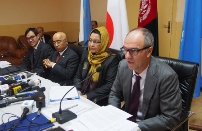 WHO Country Representative Dr Rik Peeperkorn called the grant agreement "a major step forward in fighting the burden of tuberculosis in Afghanistan"Kabul 29 November 2014 – In a ceremony held today in Kabul, the Government of Japan and the World Health Organization (WHO) signed a US$ 12 million (700 million AFN) grant agreement for the procurement of anti-tuberculosis medicines and implementation of other activities related to fighting the tuberculosis (TB) burden in Afghanistan.
WHO Country Representative Dr Rik Peeperkorn called the grant agreement "a major step forward in fighting the burden of tuberculosis in Afghanistan"Kabul 29 November 2014 – In a ceremony held today in Kabul, the Government of Japan and the World Health Organization (WHO) signed a US$ 12 million (700 million AFN) grant agreement for the procurement of anti-tuberculosis medicines and implementation of other activities related to fighting the tuberculosis (TB) burden in Afghanistan.
Afghanistan is one of 22 countries with a high burden of TB in the world. In 2013, 58 000 new TB cases occurred, resulting in 13 000 deaths. Women in Afghanistan are particularly vulnerable to the disease as they constitute two-thirds of all TB patients. Drug-resistant tuberculosis, caused mainly by poor management and treatment of regular TB cases by low quality of TB drugs, has emerged as a serious challenge, an issue that the project will also address.
“The Government of Japan and JICA have supported the work of the Ministry of Public Health in many spheres, especially in the TB Control Programme. We are grateful for their generous assistance and support, and look forward to our continued cooperation with the Government of Japan and WHO to bring about further improvements in health care and fight the TB burden in Afghanistan,” said H.E. Dr. Suraya Dalil, Acting Minister of Public Health.
The project, which will be implemented by WHO and Japan International Cooperation Agency (JICA) in partnership with the Ministry of Public Health, involves the procurement of laboratory consumables and essential drugs for TB care, the introduction of a drug management system and training for over 900 health care providers on drug management over a three-year period. It is estimated that more than 113 000 diagnosed TB patients will benefit from the project by receiving free treatment and over 565 000 people with suspected TB will be tested for diagnosis.
“In the early twentieth century, TB was Japan’s top cause of death. Improvements in public health changed the situation, and by bringing such experience, Japan has been assisting Afghan efforts in fighting TB since 1960s. In the past decade, Japan has been supporting the establishment of a countrywide TB diagnosis system to enable people to reach appropriate TB testing and treatments. Japan continues to strongly support health care for Afghans,” said H.E. Hiroshi Takahashi, Ambassador Extraordinary and Plenipotentiary of Japan to the Islamic Republic of Afghanistan.
“The Government of Japan’s support to the TB control programme is absolutely essential for ensuring that we can effectively tackle the burden of TB which remains a major public health problem in this country,” said Dr Rik Peeperkorn, WHO Country Representative. “The number of TB deaths is unacceptably high since most are preventable. This grant will enable the procurement of life-saving drugs that will accelerate our efforts in the fight against TB.”
The Government of Japan has been supporting TB control activities since the establishment of the national tuberculosis programme in Afghanistan through technical and financial assistance. WHO has provided technical support to the fight against TB through capacity-building and developing guidelines, policies and standards for TB prevention, care and control.
What is TB and how can it be treated?
TB is an infectious disease most often affecting the lungs. When people with pulmonary TB cough, they propel TB germs into the air. The symptoms of active pulmonary TB include cough (sometimes with sputum or blood), fatigue, loss of appetite, weight loss, fever, chills and night sweats. In 2012, 8.6 million people fell ill with TB and 1.3 million died from the disease worldwide. TB is second only to HIV/AIDS as the greatest killer worldwide due to a single infectious agent. TB is treatable with a six-month course of antibiotics and the vast majority of TB cases can be cured when medicines are provided and taken properly. Without treatment, mortality rates are high.








